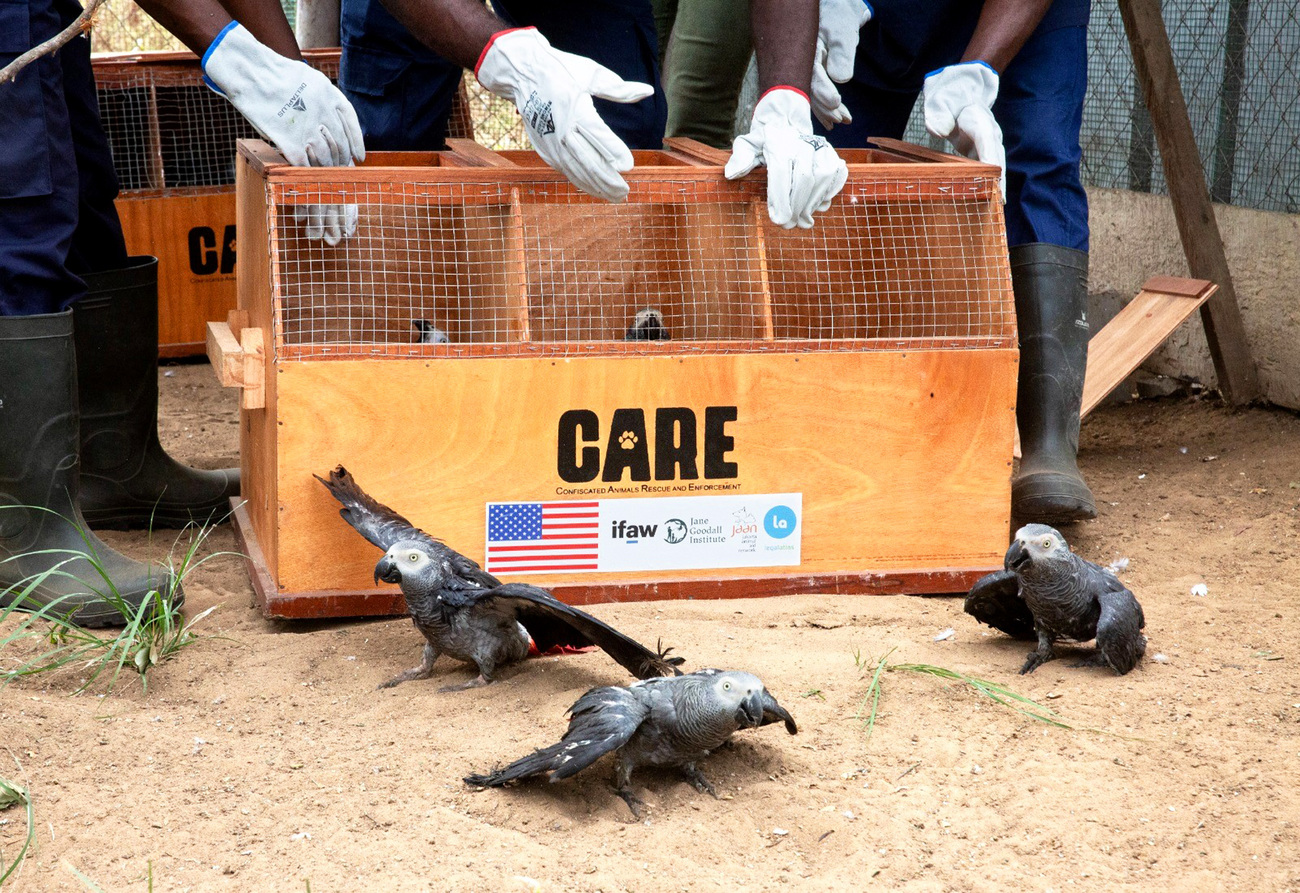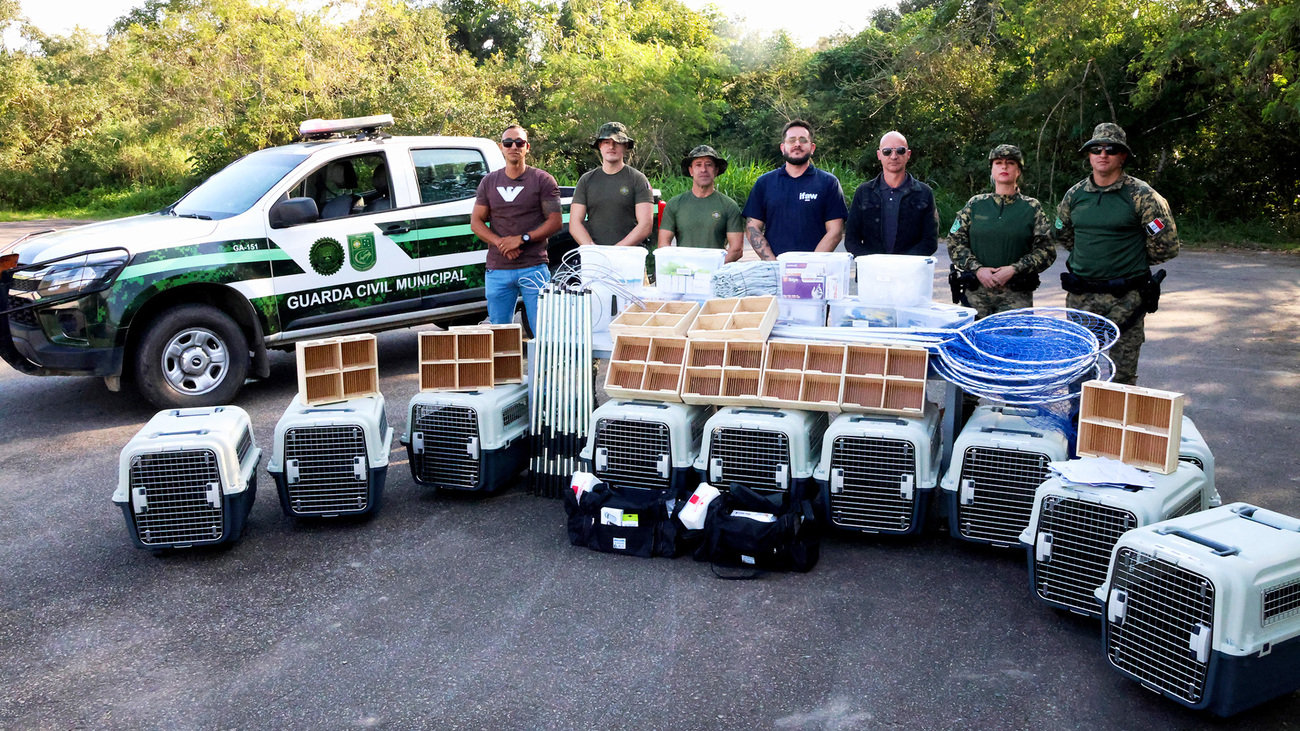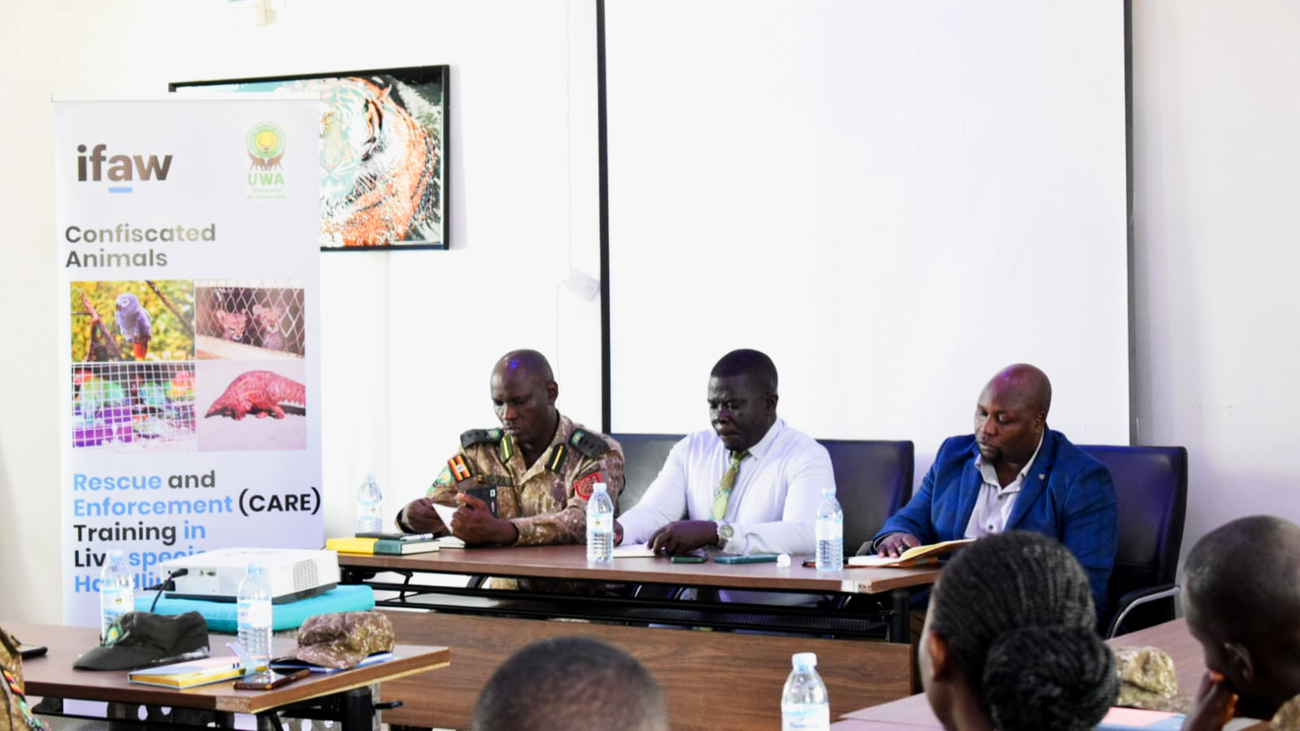CARE – Brazil, Guyana, Congo, and Uganda
Empowering frontline officers to rescue animals from wildlife traffickingTraining, tools, and trust: how the CARE project is transforming wildlife enforcement around the globe
Training, tools, and trust: how the CARE project is transforming wildlife enforcement around the globe
Around the world, frontline officers are increasingly faced with live animal confiscations—pangolins trapped in luggage, parrots stuffed in plastic tubes, monkeys sedated for transport in the cargo hold. The goal is for all these animals and more to be offered up for illegal sale. Yet many of these officers—customs agents, wildlife rangers, and border enforcement—are constantly faced with challenges which require ongoing training and equipment. That’s where IFAW’s CARE project steps in.
Funded by the U.S. Department of State’s Bureau of International Narcotics and Law Enforcement Affairs, CARE (Confiscated Animals – Rescue & Enforcement) equips frontline personnel with the knowledge, tools, and protocols they need to respond safely, effectively, and humanely when seizing live animals from traffickers.
Here are just a few examples of CARE in action, across continents, agencies, and ecosystems.

From Uganda: building skills to protect wildlife on the frontlines
In November 2024, 25 officers from western Uganda gathered in Mbarara for a four-day CARE training together with the Uganda Wildlife Authority (UWA), Uganda Revenue Authority (URA), and the Uganda Wildlife Education Conservation Centre (UWEC). Participants included assistant wardens, customs officers, private law enforcement, and veterinary personnel, all vetted and selected for their role in wildlife protection.
Did you know? Uganda’s national bird, the grey crowned crane, is targeted by traffickers for its striking plumage and symbolic value—despite being endangered. Losing this iconic species means not only a blow to biodiversity, but also to Uganda’s national identity.
The training covered topics including:
- Live animal trade and species identification
- National and international policy frameworks
- Evidence collection and management
- Zoonotic disease risks and prevention
- Animal transport, handling, health, and temporary housing
- Wildlife management and disposition planning
Each participant received printed factsheets, a USB drive with training materials, and hands-on practice with real-life scenarios. By the end of the course, the impact was clear. Pre-training assessments averaged 57%, while post-training results rose to 82%. Nearly every participant (98%) said they would apply their new skills on the job.
‘This training has made a real difference,’ said one participant. ‘Our officers now understand not just how to seize an animal, but how to care for it—and how to stop traffickers before they succeed.’
The officers also offered crucial feedback. They asked for better systems to track and manage live seizures, greater awareness at borders and airports, and stronger wildlife law education across ranks. They highlighted the urgent need for a short-term care facility and a snakebite response protocol, both key elements the CARE project is currently developing.
From Brazil: equipping officers to respond humanely and safely
In Brazil, IFAW hosted a similar capacity-building session for environmental enforcement agents and authorities engaged in combatting wildlife trafficking. To further strengthen efforts to seize and confiscate live animals, IFAW partnered with IBAMA (the Brazilian Institute of Environment and Renewable Natural Resources) to co-design and distribute 50 specialised CARE Confiscator Kits, previously proven effective in Indonesia, Congo, and Guyana. These kits are filled with key equipment needed for humane handling and transport, tailored for Brazil’s unique wildlife trafficking context and enforcement needs.

We distributed 40 kits to IBAMA’s wildlife enforcement units across all 27 Brazilian states and another 10 to the Environmental Civil Police in the Baixada Santista region, home to Latin America’s busiest port.
‘These kits will allow us to properly handle animals, minimising stress and ensuring officer safety,’ said João Alvarez de Sá, Head of IBAMA’s Wildlife Enforcement Unit. ‘This donation elevates our capacity for wildlife enforcement to a new level.’
Did you know? Brazil’s vibrant songbirds are among the most trafficked animals in the country, captured for the illegal pet trade, where their songs are sold as entertainment. Their disappearance is quiet but devastating—silencing forests and pushing species toward extinction.
‘We know this equipment will help protect both animals and officers,’ added Fábio Barbatano Marques of the Environmental Civil Police. ‘It also helps ease financial pressure on our department, ensuring we can continue wildlife rescue and enforcement efforts for years to come.’
The kits are already being integrated into IBAMA’s national wildlife enforcement training courses. Each officer will leave with new knowledge and a fully stocked kit to implement what they’ve learned.
Up next: efforts across continents
In the coming months, CARE will expand and train law enforcement agents across Suriname, Sri Lanka, Liberia, Nepal, Uzbekistan, Guyana, and Congo. We are developing each training in collaboration with national authorities to ensure relevance and long-term impact.

These trainings remind us that behind every rescued animal is a person—trained, equipped, and committed to making a difference. With CARE, we’re building a future where that person and their team are never alone.
Each live seizure is a crisis moment—for the animal, for the officers involved, and for global biodiversity. CARE helps ensure seizures lead to rescue, rehabilitation, and—where possible—the release of animals back to the wild, where they belong.
Thanks to support from the U.S. Department of State and the dedication of partners in Uganda, Brazil, and beyond, IFAW is proud to lead this work. As CARE continues to grow, so does our global capacity to stop wildlife trafficking before it’s too late, so animals and people can thrive together in the place we call home.
Related content
Every problem has a solution, every solution needs support.
The problems we face are urgent, complicated, and resistant to change. Real solutions demand creativity, hard work, and involvement from people like you.